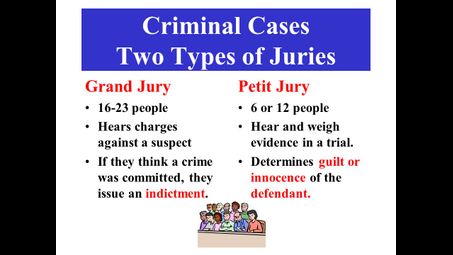Although grand juries and trial juries are both made up of average people who were called for jury duty, they serve entirely different purposes. A grand jury helps determine whether charges should be brought against a suspect, while a trial jury renders a verdict at the criminal trial itself. Put differently, a grand jury hands down an indictment at the beginning of a case, while a trial jury decides guilt or innocence at the very end (not counting the appeal process).

What else can I help you with?
What purpose does a grand jury or preliminary hearing serve?
Depending on the state you are in (some use the Grand Jury System and others use the Preliminary Hearing system) it is the hearing at which the defendant is formally charged with the offense he was arrested for.
Can a preliminary hearing be held without the defendant?
Yes. Grand Jury.
Does a preliminary hearing or a grand jury better balance the rights of society and the rights of the accused?
A preliminary hearing might better balance the rights of society and the rights of the accused. With a preliminary hearing a judge is going to weigh the evidence and decide if there is enough evidence for trial. With a grand jury, a group of citizens decides if there is enough evidence for trial.
If a defendant is arrested in a jurisdiction that doesn't require a grand jury indictment a court will then conduct a what?
A 'preliminary hearing.' aka. a probable cause hearing.
A defendant has the ability to get both a preliminary hearing and a Grand Jury?
No they are not allowed to both, they must choose between the two.
What is procedure if criminal cases?
•Initial Appearance •Filing Charges •Preliminary Hearing •Grand Jury •Arraignment •Trial •Sentencing
How long after a prelimenary hearing before you get indicted?
If the jurisdiction in question adheres to the Grand Jury system of indictment, the GJ will indict by handing down a "true bill" in the sequence in which it was presented to them. HOWEVER - if the jurisdictions NOT utilizing a Grand Jury system, your Preliminary Hearing IS your idndictiment and the presiding judge decides if there is enough Probable Cause to bind you over for trial.
Do you have to have a jury to indict someone?
It depends on the system used in your particular state. Some states still use the Grand Jury Indictment system - others use the Preliminary Judicial Hearing type of system.
What is the preliminary hearing used to decide?
A preliminary hearing, in the context of criminal law, is used to determine whether probable cause exists to believe that the offense charged in the information has been committed by the defendant. The hearing officer considers the evidence and reaches a decision on the issue of probable cause. In those states which do not employ the Grand Jury System for indictments, the Preliminary Hearing serves the same function.
What are the two ways that a person can be bound over to superior court are by .?
A person can be bound over to superior court by either a preliminary hearing or a grand jury indictment. In a preliminary hearing, a judge assesses whether there is enough evidence to proceed to trial. Alternatively, a grand jury may review evidence presented by the prosecution and decide to formally charge the individual, resulting in a binding over to superior court.
Is it proper for a prosecutor to bypass and cut off the preliminary hearings by securing an intervening indictment?
There is nothing necessarily proper or improper about it. The prosecutor at least in CA has an absolute right to have either a preliminary hearing or a get a grand jury indictment.
What does it mean when a case is waived to a grand jury?
When a case is waived to a grand jury, it means that the prosecution has decided to bypass a preliminary hearing and instead present the case directly to a grand jury. This grand jury will evaluate the evidence to determine whether there is enough probable cause to formally indict the suspect and proceed to trial. Waiving to a grand jury can streamline the legal process and may occur in cases where the evidence is strong or the charges are severe.
